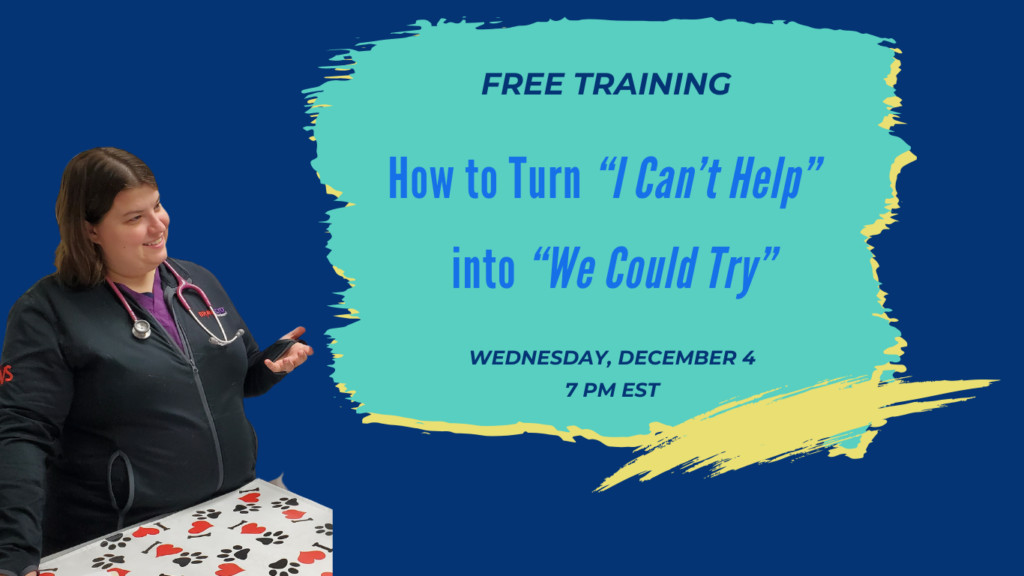But it’s really about getting back to why you became a veterinarian in the first place.
I showed up at the 2018 AVMA Convention in Denver with one goal in mind–start working as a freelance writer and speaker in the veterinary field. I proudly walked around the exhibit hall telling all of the exhibitors who would listen that I wanted to write and speak.
Their inevitable next question–which I should have anticipated but hadn’t–was, “What do you want to talk about?”
I’m not generally at a loss for words, but the first time I was asked this question, my best response was, “I don’t know. I just know I want to do it.”
I decided that getting some experience talking to students would be a good start to my speaking career and reconnected with the Veterinary Business Management Association (VBMA), who gave me some of my earliest speaking opportunities. I knew I wanted to speak on something practical that could positively impact their veterinary careers–something I didn’t feel I’d learned quite as well as I could have in school. I decided to develop a lecture on working within client financial limits.
It was this decision that introduced me to the term spectrum of care. Like many, I had been practicing with that mindset for years, though I didn’t have the term for it. It just seemed like what you did in rural practice.
Since my first lecture at Kansas State University, my spectrum of care content has grown in breadth and evolved in depth.
Beyond Finances
Client finances are a common pain point for many clients, and this barrier only seems to continue growing. As veterinary professionals we are often faced with agonizing situations where a pet’s life is on the line. In some of these cases, no matter what we do, the pet will not survive, but often, we find ourselves faced with pets who could be saved, if only one or two things were different.
The thing is, it’s not always the finances that are the “if only” factor–the barrier keeping us from being able to save a pet. I’ve come to realize that there are so many other factors, which can include client factors, like scheduling, transportation, and other caregiver obligations, and patient factors, like cooperation with treatments or stress levels in the hospital.
Minnie’s Story
While I understood this as an idea, it wasn’t until I met Minnie and her dad that this really solidified in my head and heart. I diagnosed Minnie with pancreatitis and diabetic ketoacidosis (DKA)–an unlucky combination. I told her dad that it was treatable though not every pet survived. We discussed that referral for 24 hour hospitalization was recommended and would give her the best chance at survival. Our clinic did not offer overnight hospitalization.
Her dad looked at me and said, “I can’t take her to the specialty center. It’s not about the money. I can’t be away from home that long. I have to care for my wife.”
I knew that outpatient therapy was unlikely to be enough for Minnie given that she was significantly dehydrated, wasn’t eating, and was vomiting. At that point I could have recommended euthanasia. But instead, I gave the owner the option of a hybrid hospitalization plan at our general practice. I honestly didn’t know if it would work, and I told Minnie’s dad that. I told him euthanasia was an option and would not be wrong, but if he wanted to try, we were willing.
Minnie was hospitalized during the day on IV fluids and traditional treatments for DKA, which I had managed many times in my former job as an emergency clinician. At the end of the day, we gave a dose of Vetsulin and sent Minnie home for the night. We repeated this process for 2 days.
Minnie stopped vomiting. She started eating. Her ketones resolved. She went on to be a somewhat-well regulated diabetic dog who lived for over a year after her diagnosis.
Asking “What if..”
When there is a barrier that keeps us from pursuing the traditional treatment plan–whether that is finances or something else, like in Minnie’s case–the first step to helping the client and pet standing in front of us is to stop focusing on the “if only…” factor. We need to start asking “What if…?”.
It you’re ready to move from focusing on barriers to developing solutions, join me Wednesday, December 4 for a free online training:

And don’t forget to Join the Mailing List so you don’t miss upcoming events and educational opportunities on spectrum of care!

